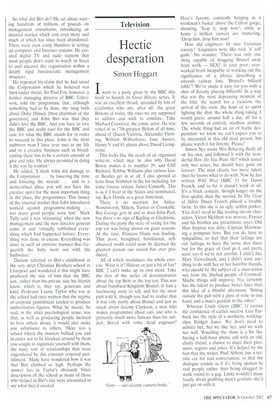Television
Hectic desperation
Simon Hoggart
Iwent to a party given by the BBC this week to launch its Great Britons series. It was an excellent thrash, attended by lots of celebrities who are, after all, the great Britons of today, the ones we are supposed to admire and wish to emulate. Take Michael Crawford, the comic actor. He was voted in as 17th greatest Briton of all time, ahead of Queen Victoria, Alexander Fleming, William Wilberforce, Jane Austen, Henry V and 81 places above David Livingstone.
This looks like the result of an organised write-in, which may be also why David Bowie makes it to number 29, and Cliff Richard, Robbie Williams plus various lesser Beatles get in at all_ I also spotted at least three Irishmen in the list including, for some bizarre reason, James Connolly. This is as if I lived in the States and nominated, say, Keir Hardie as a great American.
There is no mention for Attlee, Wordsworth, Milton, Turner or Constable. Boy George gets in and so does John Peel, but there's no sign of Kipling or Gladstone. During the party the state of voting for the top ten was being shown on giant screens. At the time, Princess Diana was leading. That poor, benighted, bewildered, selfobsessed misfit could soon be deemed the greatest person our nation has ever produced.
All of which invalidates the whole exercise. What is it? History or just a bit of fun? BBC 2 can't make up its own mind. Take the first of the series of documentaries about the top Brits in the top ten. This was about Isambard Kingdom Brunel. It had a fascinating story to tell, and for the most part told it, though you had to realise that it was only partly about Brunel and just as much about Jeremy Clarkson, a man who makes programmes about cars and who is presently much more famous than his subject. Bored with some dead engineer? Here's Jeremy, comically hanging in a workman's basket above the Clifton gorge, shouting, 'Stop it, stop now!', while at home a million viewers are muttering, 'Drop him, drop him now!'
How did engineers tit into Victorian society? 'Engineers were like rock 'n' roll gods.' No wonder: 'There was only one thing capable of dragging Brunel away from work — SEX!' Is your poor, overworked brain incapable of working out the significance of a phrase describing a smooth railway line, 'Brunel's billiard table'? We've made it easy for you with a shot of Jeremy playing billiards! In a way this was the most depressing moment of the film: the search for a location, the arrival of the crew, the hour or so spent lighting the shot, the whole thing taking, I would guess, around half a day, all for a few seconds of entirely needless airtime. The whole thing had an air of hectic desperation: we know we can't expect you to be interested in this old dead person, but please watch it for Jeremy. Please!
Simon Nye wrote Men Behaving Badly all on his own, and followed it with the wonderful How Do You Want Me? which lasted only two series, but should have gone on forever. The man clearly has more talent than he knows what to do with. Now he has written Wild West (BBC 1) for Dawn French, and so far it doesn't work at all. It's a black comedy, though longer on the first quality than the second. In The Vicar of Dibley Dawn French played a lovable fattie. In this she is an ugly, selfish porker. You don't need to like leading sitcom characters. Victor Meldrew was morose, Frasier and his brother are pretentious asses, Old Man Steptoe was dirty, Captain Mainwaring a pompous bore. But you do have to sympathise, to feel that their failings are our failings, to have the sense that there but for the grace of God go I. and pretty soon too if we're not careful. I didn't like Mary Trewednack, and I didn't want anything to do with her or her horrible friends, who should be the subject of a class-action suit from the libelled people of Cornwall. Maybe things will improve. Nye certainly has the talent to produce better lines than this idea of a blissful afternoon: 'Sitting outside the pub with a glass of wine in one hand, and a man's genitals in the other.'
Whereas Linda Green (BBC 1) carries the confidence of earlier success. Liza Tarbuck has the style of a northern, workingclass Bridget Jones. We don't need to admire her, but we like her, and we wish her well. Watching the show is a bit like having a half-hour phone call with an old, chatty friend, a chance to share their pleasures, regrets and jokes. It's helped by the fact that the writer, Paul Abbott. has a terrific ear for real conversation, so that the dialogue sounds as if it's being spoken by real people rather than being dragged to work round to a gag. Linda wouldn't muse loudly about grabbing men's genitals; she'd just get on with it.


















































































 Previous page
Previous page